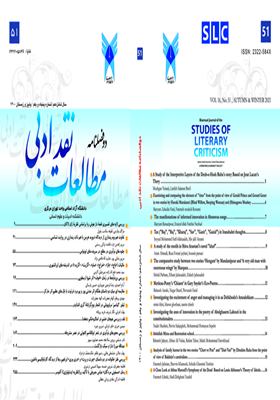A Study of the Interpretive Layers of the Dezh- e - Hosh Ruba's story Based on Jean Lacan's Theory
Subject Areas : مطالعات نقد ادبیMozhgan Venarji 1 , Latifeh Salamat Bavil 2 *
1 - PhD student, Department of Persian Language and Literature, Central Tehran Branch, Islamic Azad University, Tehran, Iran
2 - Assistant Professor, Department of Persian Language and Literature, Central Tehran Branch, Islamic Azad University, Tehran, Iran (corresponding author)
Keywords: interpretation, allegory, the Dezh- e - Hosh Ruba's, Jean Lacan,
Abstract :
A summary of the teachings and main lines of Rumi's mystical thought with a balanced and democratic approach is presented to the audience in the story of " Dezh Hosh Ruba ". To be provided to the audience. Rumi, motivated by individualism, tries to take the seeker to the "symbolic realm" after reaching the "mirror stage" and passing through the "imaginary realm", which brings him closer to the soul and brings him closer to the realm of annihilation and survival in the eternal truth. has it. In this story, princes first experience a sense of loss and separation from the principle of truth by forbidding and warning their father. Then they start the journey in the form of a journey. After passing the stage of the mirror, they enter the imaginary realm. With the help of other small objects, they try to go from the imaginary world to the symbolic world to reach the truth. In the end, the little brother, by searching the girl inside himself. Rumi appears in the roles of seeker, guide, helper, etc and by leaving the story unfinished, emphasizes the immortality of the high human spirit and the continuity of divine love, the course of his life and the ultimate extinction and Fanai fi Allah. This article seeks to interpret and express the course of psychological development, evolution of the seeker and the manifestation of the subconscious mind in this story from the perspective of Jean Lacan in an interpretive-hermeneutic method and qualitative content analysis
پاینده، حسین.(1397). نظریه و نقد ادبی، جلد اول، چاپ اول، تهران: سمت.
پورنامداریان، تقی.(1388). در سایۀ آفتاب، چاپ سوم، تهران: سخن.
جعفری، سید جعفر.(1379). مولوی و جهانبینیها، چاپ اول، تهران: موسسۀ تدوین و نشر آثار علامه جعفری.
خطیبی، احمد.(1396). درآمدی بر تمثیل در ادبیات فارسی، چاپ اول، تهران: زوار.
چتیک، ویلیام، شیمل، آنه ماری و دیگران.(1386). میراث مولوی (شعر و عرفان در اسلام)، ترجمۀ مریم مشرف، چاپ اول، تهران: سخن.
رازی، شمس قیس.(1383). المعجم فی معاییر اشعار العجم، تصحیح محمد قزوینی و مدرس رضوی، چاپ پنجم اول، تهران: دانشگاه تهران.
زرینکوب، عبدالحسین.(1378). بحر در کوزه(نقد و تفسیر قصهها و تمثیلات مثنوی)، چاپ هشتم، تهران: علمی.
زمانی، کریم.(1378). شرح جامع مثنوی معنوی، دفتر ششم، چاپ اول، تهران: اطلاعات.
سجادی، سید جعفر.(1393). فرهنگ اصطلاحات و تعبیرات عرفانی، چاپ دهم، تهران: طهوری.
شهیدی، سید جعفر.(1390). شرح مثنوی، دفتر ششم، چاپ پنجم، تهران: علمی و فرهنگی.
شمیسا، سیروس.(1391). مولانا و چند داستان مثنوی، چاپ دوم، تهران: قطره.
شامیان ساروکلایی، اکبر.(1392). آینۀ معنی (تمثیل در بلاغت فارسی و عربی)، چاپ اول، تهران: علمی و فرهنگی.
صادقی، مریم.(1394). نثر فارسی در سپهر سیاست، چاپ اول، تهران: نگاه.
غنی، قاسم.(1375). بحث در آثار و احوال و افکار حافظ، تاریخ تصوف در اسلام، جلد دوم، چاپ هفتم، تهران: زوار.
فتوحی، محمود.(1397). بلاغت تصویر، چاپ پنجم، سخن: تهران.
کرین، ویلیام.(1396). نظریههای رشد (مفاهیم و کاربردها)، ترجمۀ غلامرضا خوینژاد و علیرضا رجایی، چاپ چهارم، تهران: رشد.
کلیگز، مری.(1388). درسنامۀ نظریۀ ادبی، ترجمۀ جلال سخنور و دیگران، چاپ دوم، تهران: اختران.
همایی، جلالالدین.(1385). تفسیر مثنوی مولوی (دژ هوشربا)، چاپ ششم، تهران: هما.
یونسی، ابراهیم.(1384). هنرداستان نویسی، چاپ هشتم، تهران: نگاه.
ب) مقالهها
راباته، ژان میشل.(1382). پیشدرآمدی بر ژان لاکان، ترجمۀ فتاح محمدی، مجلۀ ارغنون، شمارۀ 22، صص 228-193.
شیری، قهرمان، مهری، بهروز، حسینی آبباریکی، سید آرمان.(1391). از لاکان تا مولانا(نگاهی لاکانی به سیر رشد روانی سوژه در آرای مولانا)، دو فصل نامۀ ادبیات عرفانی ، دانشگاه الزهرا، سال سوم، شمارۀ 6، صص100-81)
علوی مقدّم، مهیار.(1387). نقد روایت شناختی به داستان کوتاه نادر ابراهیمی، مجلۀ ادب پژوهی، شمارة 6، صص 178-163.
_||_
